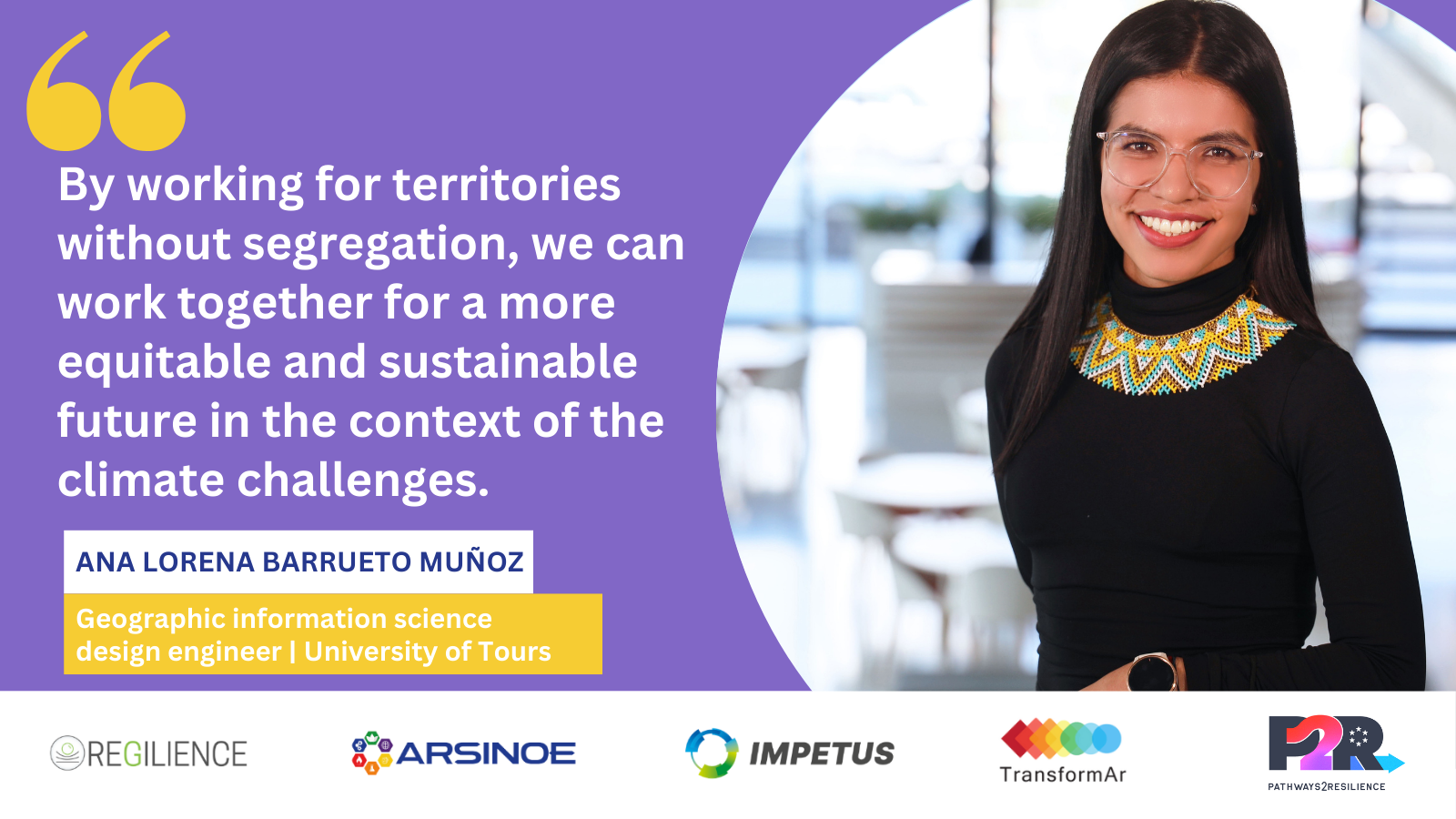“By working for territories without segregation, we can work together for a more equitable and sustainable future in the context of the climate challenges”: Ana Lorena Barrueto Muñoz interview
The complex challenge of adapting to climate change requires collaboration between many fields of expertise and the diverse approaches of different projects. ARSINOE is working closely with sister climate change adaptation projects IMPETUS, TransformAr and REGILIENCE. Together, these involve many inspiring people whose skills and experience contribute in various ways to creating resilience and adaptation tools, solutions and initiatives. We will share some of their stories as the projects progress.
For the International Women’s Day, we decided to interview some of the youngest and inspiring women in our projects. Today, we have spoken with Ana Lorena Barrueto Muñoz, geographic information science design engineer, University of Tours.
Please present yourself and your involvement in the ARSINOE project.
I’m Ana Lorena, I was raised and grown in Bogotá, Colombia. Nowadays, I’ve been living in Nice, France since September 2022. I’m passionate about working for and with people with the aim to improve life conditions.
I find it incredibly rewarding to use my knowledge to listen, advise, and work with people around me. I strive to be the best version of myself, both professionally and personally, to find solutions for the people I’ve had the opportunity to work with.
So, I would say that I take every opportunity that life gives me, and that’s why I got involved in the ARSINOE project, I just recently joined the ARSINOE team last February 15th.
What is your educational background? What did you study? And what inspired you to pursue such education and led to the point of your career where you are now?
I’m a cadastral engineer and geodesist from the Distrital University in Bogotá D.C. Colombia, with a PGDip Territory Management and Appraisals from the University Santo Tomas also in Bogotá. Here, in Nice, France, I recently did a master’s degree, related to Master Cities (MSc Engineers for Smart Cities) at the University Cote d’Azur – IMREDD.
Reflecting on my educational and professional journey, I’m recapping all the valuable lessons I have learned. I grew up in an environment where hard work, resilience, and perseverance were not just values, but a way of life.
Nowadays, I can say that I’m so proud of myself. All the challenges I have faced and overcome have made me the person I am today, and I couldn’t be prouder of my journey so far.
I believe in dreams, and I have as a guideline that the universe will put me in situations, I’ll be able to face.
Why did you want to get involved in climate change adaptation projects?
I have had the opportunity to work for the government of my country since 2014, and I have been fortunate to travel through many territories, to interact with different communities, and I have learned that we can all work together to achieve and improve situations and humans’ quality of life.
Climate change affects everyone, and every action and opportunity we have to help the planet will persist and transcend over time. We should unite and work together to address this global problem because only through collaboration we can generate significant and positive change.
What kind of skills and experiences have most equipped you to contribute to the goal of climate change adaptation (examples)?
My background as a cadastral engineer offers me a perspective to address the challenges of climate change adaptation. Having good expertise in housing issues, and urban planning in a country like Colombia, allows me to have a high degree of adaptability in changing circumstances, and dissemination of information to the community.
From my point of view, prioritizing people is essential in climate change adaptation efforts. Establishing strong connections and promoting inclusivity are crucial steps towards creating resilient communities and reducing vulnerability. By working for territories without segregation, we can work together for a more equitable and sustainable future in the context of the climate challenges.
What do you feel has been your biggest achievement/contribution to date?
I consider that my greatest achievement to date has been building a new life in France. Always open to learning and working with discipline and persistence, I decided to leave my family and my job in Colombia to pursue my dream.
With only a few suitcases and my savings, I started from scratch in this country.
After finishing my master’s degree, I joined the ARSINOE project thanks to the University of Tours and Professor Isabelle La Jeunesse.
This experience shows my ability to face challenges and adapt to new environments, and I am proud to have achieved this and continue on this path of challenges and learning in my life.
From your perspective of your field of expertise, what is the biggest challenge now regarding our ability to adapt to climate change?
From my experience, I consider that one of the biggest challenges in the issue of climate change adaptation is related to socio-economic vulnerability.
When there are communities with limited resources and perhaps with incomplete access to basic services, a gap with other communities in terms of adaptability can be evidenced.
Therefore, I believe that prioritizing social inclusion and developing programs with these communities in their territories is crucial to promote better spaces. This approach creates a pathway for anticipating and designing strategies for adaptability to possible future risks.
What makes you the most hopeful for the future?
I believe in people; I believe in a future where cooperation and solidarity can be the pillars to create and/or reinforce better and sustainable places. I feel that nowadays the objective is to promote a collective awareness that strengthens processes to generate innovations and collaborations. Because it is not about individual achievements, it is about collective progress.
I trust that there are more of us who want to contribute to the planet, it is our only home, and we must take care of it, not just for ourselves but for everyone.

